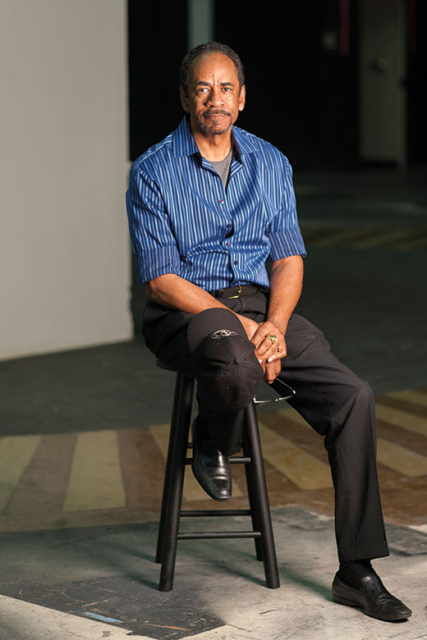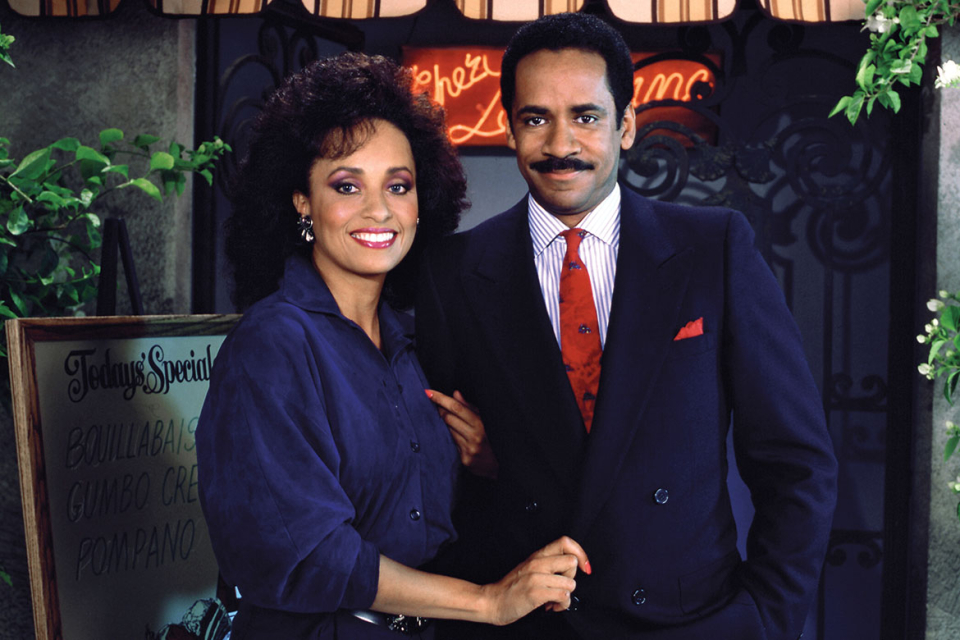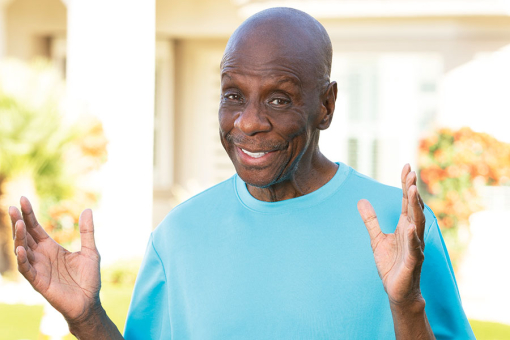When Tim Reid first appeared in WKRP in Cincinnati — the show that would jump-start his career — he was sporting a purple suit and hat, a full-length white leopard-spotted coat and a towering afro. "It's the hour of darkness, children," he intoned as DJ Venus Flytrap, while the closing credits of the pilot rolled, "and Venus is on the rise in Cincinnati. The moon is high and so am I. So let's get down, pretty brothers and sisters. Let's prowl and howl. After this word from Shady Hills Rest Home..."
Reid could look back later and laugh. "I guess we didn't get away from any stereotypes in the pilot, did we?" he cracked in the memoir he penned with his former comedy partner, Tom Dreesen. But defying stereotypes has been a lifelong pursuit for Reid, an actor-writer-producer-director who began telling stories as a child in Virginia, at the urging of his grandmother.
As a young man, Reid had a stint in the business world before creating a comedy duo with Dreesen. This was in the late 1960s, when the sight of a Black man and a white man working the cabaret circuit together was an anomaly, and the pair paid a price for their courage. From stand-up, Reid made the jump to television, joining the ensemble cast of The Richard Pryor Show and eventually landing his role as Venus Flytrap on CBS's WKRP in Cincinnati in 1978. The show lasted until 1982, by which time Venus had assumed cult-figure status.
In 1987, Reid executive-produced and starred in CBS's Frank's Place, which also starred his second wife, Daphne Maxwell Reid. He earned two Emmy nominations for the series in 1988, one for outstanding comedy series and the other for outstanding lead actor in a comedy series.
But after a brief, but life-changing conversation with CBS chairman William Paley, Reid decided to take an active role in creating the kind of work he wanted to see onscreen. He explains: "That's when I knew that I had to be more involved in the creation of images, and even spend my own money to make sure the people responsible for my being who I am had an opportunity to be seen." As a result, he and Daphne founded their own production studio in Virginia. They sold the property in 2015 but still support the next generation of storytellers through his Legacy Media Institute.
Reid was interviewed in May 2021 by Adrienne Faillace, producer for The Interviews: An Oral History of Television, a program of the Television Academy Foundation. The interview was a coproduction with the American Comedy Archives at Emerson College. The following is an edited excerpt of their conversation. The entire interview can be screened at TelevisionAcademy.com/ Interviews.
Q: Tell us a little about growing up in Virginia.
A: I was taught very early to be the storyteller in the family. My grandmother ran a boarding house and sold whiskey illegally and ran the numbers, so there were a lot of characters coming and going. She would always tell me, "Junior, tell that story about when So-and-So was here." So from about ten years old to this day, I've been plying my wares as a storyteller.
Q: When did you start acting?
A: I played the priest of Zeus in Oedipus Rex — that started me acting in school [Norfolk State University, then called Norfolk Division of Virginia State]. Then when I graduated from college, I went to work. [Reid was the first Black man recruited for E.I. DuPont's management training program.] I didn't think about show business again for a long time. Finally, I met Tom Dreesen and we formed a comedy team.
Q: You tackled race head on, as a Black man and a white man.
A: Not only did we tackle race, race tackled us. We wrote a book called Tim & Tom: An American Comedy in Black and White. We worked everywhere — the Chitlin' Circuit, all-Black clubs, all-white clubs, Polish Legion Halls — anywhere there was an opportunity to stand before people. As soon as we walked on stage, you could hear a pin drop. People would look at us like, "Oh my God, what's about to happen?" If we were fortunate enough to get them in the first minute, there was a release of tension that you could feel.
We were, I would say, the most successful Black and white team in the history of comedy. We were together for almost six years. We were attacked, got in fist fights, someone poisoned me. It was quite an interesting ride, to say the least.
Q: How did you become part of the ensemble of The Richard Pryor Show in 1977?
A: I was in L.A., trying to make it as a single stand-up. [Comedian] Paul Mooney and I were friends; we worked at The Comedy Store. After a late-night shift, Paul called and said, "Richard's got a new show, and he wants me to put together a comedy troupe. I want you guys to come." So we all went over — Robin Williams, John Witherspoon, Marsha Warfield, myself and others. We did four episodes. It was one of the most fascinating experiences. There's been nothing like it on television since.
Q: Did you all contribute material?
A: Oh, yeah. Richard, being a master storyteller, got his juice from the audience response. So his idea was, if he brought in a lot of young comics, we would improvise. Out of that, he would be inspired. There were no scripts.
We'd ask, "What's the sketch today?"
He'd say, "The First Black President" — that's a scene that I see on the internet quite a bit now — "Go in wardrobe and pick out your outfit."
I decided, because of my civil rights activity, I'd get a black beret and an Army jacket; I'd be that militant brother. Spoon [John Witherspoon] had a suit; Marsha Warfield decided to be a reporter. Richard came in. Everything after that just happened.
Many of the episodes we did could not be shown on television because they were a little too far over the edge. But we had so much fun. It was rare to have that kind of freedom.
Q: Not long after, you were cast as Venus Flytrap on CBS's WKRP in Cincinnati.
A: I'd just been fired from a show. The director and I did not get along. He kept saying, "You're not Black enough." He kept trying to make the character more foolish, more stereotypical. So finally, Bonny Dore — a TV producer and a dear friend — called and apologized and said they were going another way. I said, "Wonderful!" I didn't want to play that character. But it bothered me. I had never been fired from anything in my life. I thought, "That's it, I'm never going to make it in show business."
Q: But then you got a call....
A: Yes, Monday morning, I got this call: "Go read over at MTM for a new show." I went over and looked at the script. The character [radio DJ Venus Flytrap] comes in with a big hat, ermine-collared fur coat, and his first line is, "Yo mama!" I was like, "Oh no, not again!" I wanted to walk out. But I decided, "I'm tired of this. I'm going to tell them what I think."
When they called me in, everybody was in the room: Grant Tinker [head of MTM Enterprises and later chairman of NBC], [director] Jay Sandrich, the pilot king, and a bunch of other people. They asked me what I thought.
I said, "I come from a Black community. I was born in segregation, raised in what you call a colored town. And the Black disc jockeys I grew up listening to in the South had larger-than-life personas when they were broadcasting, but when they were off the air, they were real people with real lives. They didn't look or act or talk anything like the way they did on the radio."
The producer, Hugh Wilson, agreed and asked me to do the reading. So I read it. I left. I knew I wasn't going to get it. But Hugh stood up for me. That's how I got to be Venus Flytrap.
Q: Were you able to shape Venus into a character you liked better? Did you have input?
A: I had a lot of input. Hugh — he passed away a few years ago, he was also one of my dearest friends — he gave me the opportunity to insert culture into the character as I knew it. He was a great writer. He would say, "Tell me about yourself." I was going through some Eastern religion at that time — the gong, candles, astral projection. He began to incorporate it in the character.
I had just had the pleasure of seeing Bob Marley perform. We picked our own music [to play on the show], so I started" "playing Bob Marley music. Hugh let me pick my own clothes, so I had wardrobe design for me.
Hugh also let me write a few episodes. And he wrote a script for me about the Vietnam War. The network would only let us do it if the military could sit in on rehearsals. So for four days, Vietnam veterans watched us, then they gave us the go-ahead to do that show. That not only turned WKRP around — we got picked up for a second season — but it turned me around in my career. I became more involved. And it led to my first acting award. I got an award from the United States Marine Corps.
Q: You later developed a series with Hugh Wilson, Frank's Place, which led to your two Emmy nominations. How did you and Hugh pitch it to CBS?
A: My dad had owned a restaurant, so I said, "Let's do something about a restaurant-bar." We pitched it to Kim LeMasters [then vice-president of CBS Entertainment] and all the execs. They liked it and one guy said, "Why don't you do it in New Orleans?" I loved New Orleans. Hugh wrote the pilot script. The network liked it and said, "Do it the way you want."
One of the most extraordinary things was, after we did the pilot, I was in New York at CBS showing it to the employees — I wanted them to get excited so they could promote it. As I was about to leave, someone said, "William Paley [then network chairman and former CEO] wants to see you." And I was, like, "Excuse me? Really?"
It was just like out of Network, this guy sitting in a chair with the sun behind him, in silhouette. I sat at the other end of the long table.
He said, "Young man, I've seen your show. I like it. I would have been proud to have it on the network when I ran it." I said, "Wow, thank you, sir."
He then said, "I have one question to ask you: What is your propaganda?"
Q: How did you respond?
A: I paused for a moment to gather myself. That's a serious question. I told him I had watched television since I was able to understand what the dancing images were on this little black-and-white box. And in all that time as a kid, I never saw people who looked like people in my neighborhood. I've never seen — even to this day — the kind of people that I grew up with: my aunts, my uncles, people who ran the corner store, the people who were entrepreneurs, who sold homes....
There was one attempt, Amos 'n' Andy. The neighborhood and the background were real, but some of the characters were buffoonish. That was the closest thing. But I didn't see them in dramas. Most of the women in my family were working in white people's homes, but we didn't see what life was like when they went home.
So I said to William Paley, "My hope is that through this show, I begin to show you my community... I begin to show you the people who I love dearly, who are responsible for me sitting in this chair." He thanked me and wished me the best.
That was the end of the meeting. But it changed me. That's when I knew that I had to be more involved in the creation of images, and even spend my own money to make sure the people responsible for my being who I am had an opportunity to be seen. I still feel the need to do that.
Q: Shortly after Frank's Place was canceled, you had yet another series for CBS, Snoops....
A: One of my favorite old movies is The Thin Man, so Snoops was basically The Thin Man, with Daphne and me playing Nick and Nora Charles. That show was so different from anything anybody was doing with a Black couple. We had to fight for everything. I knew it wasn't going to go more than thirteen [episodes]. So I decided to take the money that I'd made on the show and buy a farm. I moved back to Virginia and quit the business.
Then one day my business manager called and said if I wanted to keep my farm, I needed to get back to work. So I started working in television again, in Sister, Sister and a few other things.
Q: How did you feel about the storytelling on Sister, Sister?
A: I had my battles. But when I met the twins [Tia Mowry-Hardrict and Tamera Mowry-Housley], I knew they were talented. They had an innocence about them that was fun to watch. And I knew Jackée was one of the most talented and serious actors I had ever worked with. Over those six years, the three of them kept me sane.
The writers and I, we fought. I was building a studio at the time, and my focus was somewhere else.
Q: Why did you decide to launch a studio?
A: It was because of the meeting with William Paley. I decided that if I was going to control my propaganda, I had to have a studio. I had to be able to finance and create the shows that I wanted to do. And we did.
In our first year, we were doing well. We developed a show for Showtime [Linc's], we did a couple films that we financed in-house and a lot of documentaries. But I saw that Hollywood would no longer support me. I wasn't any threat to the business, but if my studio succeeded, more people would want to do what I was doing. Like now, because of the success of Tyler Perry's studio, everybody wants to be in the studio business.
So I decided, during this pandemic, to create LG|CY [Legacy of a People Network], a streaming service designed for and by the African diaspora, and not just in America. In my travels, I've spent a lot of time in places like Ethiopia, Nigeria, South Africa, Cape Verde and England, working with people from the motherland. I've seen this talent develop. So we created this streaming service to be a showcase for some of that talent.
Q: We've been conducting these oral history interviews for more than twenty years. What do you believe is the value of preserving behind-the-scenes stories from the industry?
A: I was once told that everything we say or do in broadcast — whether by radio, TV, CB radio — is out there forever. Somewhere out there floating is the original broadcast of I Love Lucy. All you need is to receive it. These stories that you're doing, or stories that I do, are out there. And hopefully, some young person — like I was when I watched Stevie Wonder or Leslie Uggams, when I watched these people on TV for the first time — the excitement, the thrill of seeing and hearing them will inspire them to rise above mediocrity... will inspire them against all odds to achieve something. That's the power of storytelling.
To see the entire interview, go to: TelevisionAcademy.com/Interviews
To read an excerpt from Tim & Tom: An American Comedy in Black and White, click here.
This article originally appeared in emmy magazine issue #4, 2022.












